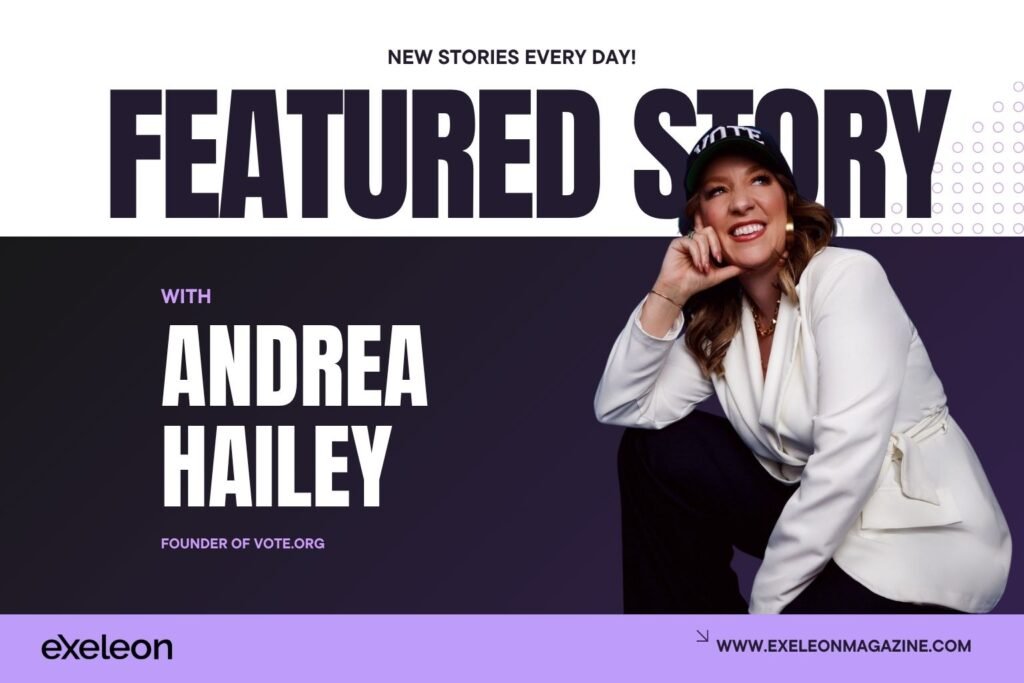Born Into Justice
Andrea Hailey doesn’t remember a time when advocacy wasn’t a part of her daily life. As a child, she wasn’t simply raised in a home that valued justice—she was raised in a law office, quite literally. Her parents, civil rights attorneys in Indiana, ran a small but mighty legal practice where justice wasn’t measured by the size of a case but by the opportunity to make something right.
“It didn’t matter if it was the largest case or someone walking in off the street with a small issue,” Andrea recalls. “If my parents could see something was wrong that needed to be right, they would help—even if the client paid in lasagna.”
That ethos of service was Andrea’s foundation. From her earliest days, she was surrounded by legal minds not only concerned with the rule of law but with uplifting their community. It was never about prestige or profit—it was about people. And that people-first lens would shape every chapter of her life and career.
Her family’s activism extended beyond the courtroom. While the 1965 Voting Rights Act outlawed racial discrimination in voting, her parents understood the work was far from over. They helped neighbors get to the polls and embedded the value of civic participation in everyday life. This wasn’t just about checking a box on Election Day. This was democracy as a lived, shared responsibility.
Lessons from Legends
Growing up in a household dedicated to civil rights placed Andrea in direct contact with history. From a young age, she met and learned from icons like Coretta Scott King, Juanita Abernathy, and John Lewis—leaders who didn’t just make history, but carried it forward.
Mrs. King’s words stayed etched in Andrea’s memory: “Freedom is never really won. You earn it and win it in every generation.” The quote was a refrain in the Hailey household; a lesson Andrea took to heart. Rights aren’t inherited; they are protected and renewed by each generation.
When she thanked Juanita Abernathy for her sacrifices, Mrs. Abernathy looked Andrea in the eye and said, “Stop thanking me.” Instead, she passed the torch: Carry the work forward. That moment was a turning point for Andrea—a call to action.
“From that moment on,” Andrea mentions, “I knew it was my duty to take my rotation on the wall. To protect democracy, so that the next generation has one to live in.”
And when she walked across the Edmund Pettus Bridge with Congressman John Lewis to commemorate Bloody Sunday, she asked him what today’s generation might be forgetting. She expected a tactical answer. Instead, he said simply: “You have to keep your joy.”
“That joy is what carries you through the hardest moments,” Andrea reflects. “It’s how you push through exhaustion and setbacks. Joy is what builds resilience.”
Democracy as Destiny
Andrea’s calling wasn’t something she stumbled upon; it was written into her DNA. Her grandfather, a Black veteran of World War I, faced poll taxes and intimidation when he tried to vote. Her great-grandmother, from a family of South Carolina sharecroppers, had to pass literacy tests to access the ballot box.
These weren’t distant memories, they were of Andrea’s inheritance. Raised in a family where civil rights law was the family business, Andrea watched her parents dismantle racism, including their role in a major case that led to the bankruptcy of the Ku Klux Klan in Indiana.
Politics and purpose weren’t separate. They lived together. Even as a child meeting Representative Patrick Kennedy, she confidently declared she would one day work for him. That prophecy fulfilled itself when she launched her career on Capitol Hill in his office.
Scaling a Mission
When Andrea took the reins at VOTE.org, the largest nonpartisan voting rights platform in the U.S., she brought two decades of experience in voter engagement—from Capitol Hill to presidential campaigns. But what truly set her apart was her ability to translate deeply personal purpose into scalable impact.
Under her leadership, VOTE.org quadrupled its impact, reaching more voters than ever before. Andrea’s first move? Diversify the funder base. She traveled extensively to bring in new grassroots donors, fostered cross-sector partnerships, and rebuild trust with civic organizations, universities, and influencers.
“It’s not about how I want to communicate,” she says. “It’s about how an 18-year-old student, a tradesperson, or a new voter wants to be reached.”
This mindset led to a 50-state get-out-the-vote campaign that reached over half a billion voter contacts. The secret? Meet voters where they already are.
Andrea and her team formed partnerships with platforms like Snapchat and Tinder, organizations like the NBA and Southern Poverty Law Center, and even pop culture icons like Taylor Swift to amplify their reach. These weren’t gimmicks—they were bridges. The result? An astounding 81% conversion rate among users who interacted with VOTE.org.
“It’s about community,” Andrea says. “It’s about bringing civic engagement into everyday life.”
Lifting Every Voice
One of the most critical shifts Andrea made at VOTE.org was intentionally focusing on traditionally excluded communities. “Voting history is like credit history,” she explains. “Young people don’t get courted by political parties because they’re seen as low-propensity voters. But they’re the future.”
Rather than ignoring them, VOTE.org did the opposite: they prioritized them. They launched on-ramps for first-time voters, demystified the voting process, and provided year-round information. From how to register to what’s on the ballot, Andrea’s team ensured voters had what they needed, when they needed it.
This wasn’t just about elections. It was about building a culture of democratic participation.
“People think politics is something separate from their lives,” Andrea says. “But every part of our lives—from our schools to our streets to our paychecks—is affected by it.”
Democracy Is a Living Thing
“Democracy is a living thing,” Andrea often says. “It has to be nurtured, protected, and practiced.”
That doesn’t just happen at the ballot box. It starts in community. It starts with showing up for one another.
“Register yourself, then register three friends. Share your voting plans. Talk about your local elections,” she urges. In 2025 alone, over 30,000 city council seats, 22,000 school board positions, 5,000 mayoral offices, and 1,000 judgeships will be decided. “These positions affect our daily lives far more than most realize.”
Andrea is passionate about demystifying civic participation. National politics may dominate the headlines, but it’s the local ballots that often hold the most immediate power over our lives. Her call to action is simple but urgent: Democracy only works if we all show up.
Toward a More Perfect Union
So, what does a truly representative democracy look like to Andrea Hailey?
“It’s one where everyone—regardless of background—has the ability to cast a ballot and have their voice heard,” she says. “The people should decide the leaders, not the other way around.”
But she’s quick to acknowledge the fragility of this vision. “We’re in a defining moment. Some want a more inclusive, participatory democracy. Others are pushing for a more authoritarian model. The next few election cycles will determine which path we choose.”
For Andrea, the answer is clear: show up, speak out, and vote. And don’t do it alone.
A Rotation on the Wall
Andrea Hailey sees her work not as a career, but as a rotation on the wall—guarding the fragile promise of democracy so it can be passed to the next generation.
She leads with joy, purpose, and unshakeable conviction. She is as comfortable on a panel of policymakers as she is in grassroots community centers, reminding voters that their voices matter.
From the child in the nursery room of a small Indiana law office to the CEO leading the largest digital voting platform in America, Andrea’s journey has come full circle. But her mission continues.
And with every election, every voter registered, and every barrier dismantled, she brings us one step closer to the democracy we deserve.
Contact Andrea Hailey on LinkedIn.











